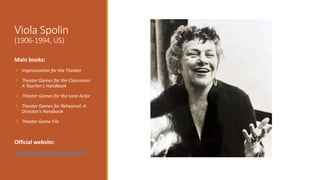This document summarizes a cultural educator's theater workshop for teachers in Brazil. Over four meetings, the educator led games and exercises focused on body awareness, sounds, movement, objects, and imagination. Questions were discussed to help teachers understand theater elements and how to develop performances with children. The workshops explored concepts from Augusto Boal and Viola Spolin on using games and improvisation. A 10-part sequence was proposed for introducing theater language in primary schools through playing.

















